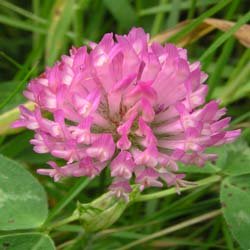|
Red Clover
Introduction[Top] Red clover is also known as trifolium pratense, cow clover, meadow clover, wild clover. It belongs to the legumes family along with beans as well as peas.
Trifolium is a type of clover, native to western Asia, Europe, as well as northwest Africa. It is also naturalized and planted in many other areas. It contains compounds called phytoestrogens. They are comparable with female hormone estrogen. Trifolium contains many nutrients including magnesium, phosphorus, vitamin C. niacin, potassium, thiamine, calcium, and chromium.
What trifolium is used for[Top] In the past, it has been employed as an ingredient in Home remedies for asthma and used in cough home remedies it is also used to treat bronchitis. Presently it is employed for high cholesterol, osteoporosis, prostate enlargement symptoms, menopausal symptoms, and breast pain.
How trifolium is used[Top] The flowered parts of the trifolium are used to make extracts, which are available in capsules, tablets, teas, as well as liquid forms.
Science Says[Top] Scientific tests show that trifolium contains isoflavones. Isoflavones are plant-based chemicals, which make estrogen-like effects within the body. Isoflavones are potentially useful in treating numerous conditions, which are associated with menopause, like hot flashes, osteoporosis, and cardiovascular health. Preliminary evidence in a small number of studies suggest that isoflavones may slow down bone loss as well as even boost the bone mineral density within women who are pre-menopausal and menopausal Studies have shown Trifolium improves blood flow through veins and arteries. However, the study in this area is limited. Cautions and side effects[Top] There have not been any serious side effects reported with trifolium. General side effects might include a rash, headache, and nausea. Women who are pregnant or breastfeed should not take trifolium. Because trifolium has an estrogen-like effect, it should not be taken by women who take birth control pills or on HRT (hormone replacement therapy). Back to natural healing home page
|
Loading



